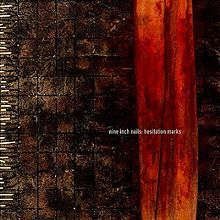On my mark
A review of Nine Inch Nails’ latest album, “Hesitation Marks”

In 2009, Trent Reznor, frontman and founder of Nine Inch Nails, retired his band with the conclusion of the aptly named “Wave Goodbye Tour.” After 20 years, he expressed a desire to work on other projects, including his second band, How to Destroy Angels, and scoring the soundtracks of films such as The Social Network and The Girl With the Dragon Tattoo, for which he won critical acclaim.
Thus, it came as a surprise to the music world when in early 2013, Reznor announced the return of Nine Inch Nails with tour dates and the release date of a new album. Originally, Reznor (a multi-instrumentalist who records his band’s music on his own and hires musicians to tour with him) had planned to record a compilation of his greatest hits to fulfill a contractual obligation with Interscope Records. However, while recording two original songs to add to the album as a bonus, Reznor was inspired to write an entirely original album. Thus, Hesitation Marks came to be.
In the band’s best album since 1999’s critically acclaimed The Fragile, Reznor weaves a story of depression, in which each song tells of a different aspect of the unnamed character’s struggle.
After an eerie, instrumental introduction, the album launches into the percussion-heavy “Copy of A,” a sarcastic take on society and how it conflicts with individualism. Reminiscent of the band’s debut album, Pretty Hate Machine, the track, one of the best on the album, is bristling with electronic and percussive elements. Next is the rock-influenced “Came Back Haunted,” which reflects on change and its effects. This track, another standout, is similar to the material found on With Teeth.
The next four tracks, “Find My Way,” “All Time Low,” “Disappointed,” and “Everything,” are more experimental and deal with the character praying for help, realizing the severity of his plight, expressing disappointment for abandonment, and ultimately surviving his depression, but only cautiously acknowledging that it is over for the time being. These four are a mixed bag, with “Find My Way” and “Disappointed,” two minimalistic pieces (the first of which is better thanks to its more touching, memorable instrumental), “All Time Low” an experimental, yet solid, funk-heavy track, and “Everything” a surprisingly short, upbeat, pop rock song. Of these, “Everything” is a weaker track, but not because of the song itself. Though catchy, the song’s uplifting spirit does not mesh with this album at all. As for “Disappointed,” it drags on too long, despite its haunting, percussion-based rhythm.
After these tracks, the protagonist suffers a relapse of sorts. Once again, the next four tracks are quite different, from the electronic/Michael Jackson-influenced “Satellite,” a song about facing the invasion of privacy (and possibly a jab at the NSA, and former President George W. Bush and President Barack Obama) that is another album highlight, to “Various Methods of Escape,” a rock piece that is a cry for help. Possibly the best song on the album, it sees the protagonist contemplating how to escape his situation, suicide being one of the options that is ultimately rejected. “Running” is a weaker follow-up, detailing the protagonists’ efforts to survive the depression after deciding not to commit suicide. The instrumental, however, does not match the pace of the lyrics here in many places. Immediately afterward is the cacophonous “In Two,” chronicling the struggles the protagonist faces in deciding their identity with the current crisis. Reminiscent of The Fragile, and even The Downward Spiral, fans of old school “NIN” would enjoy this track. Next is “While I’m Still Here,” an odd, minimalistic piece somewhat reminiscent of “Find My Way,” from earlier in this album. It discusses the importance of one’s time being limited, and making use of that time. While not the most instrumentally spectacular piece on the album, the message is spot on. Ending the album is another chilling instrumental, leaving the fate of the protagonist unknown.
As is always the case with Nine Inch Nails, the album features masterful instrumentation. Countless layers of sound stacked on top of one another are utilized without comprising one another, requiring multiple listens in order to get the full effect of each track. Each listen uncovers a new nuance, a new detail, that makes each track that much more intriguing, and further cementing Trent Reznor’s musical genius. Only on The Fragile and The Downward Spiral, the band’s two most acclaimed albums of all time, has such a lush soundscape been achieved by Nine Inch Nails.
Combined with flawless instrumentals, Reznor’s lyrics and delivery are full of emotion, and convey feelings of desperation, confusion, and a quiet, brooding anger. The lyrics have even improved over the band’s previous releases, many of which utilized the phrase “hands and knees,” repeatedly. Fortunately, this is not the case here. Additionally, meaning of each song is ambiguous. While tying into the narrative of a depressed person, multiple interpretations have been found for each song, highlighting refined songwriting.
As for the narrative of the album itself, though not as intense or angry as The Fragile or The Downward Spiral, it is still gripping. More refined, it is an almost reflective look back on the situation, as if the album is a compilation of memories from the depression of the protagonist, indicating that he or she did indeed overcome depression. Such a view is appropriate, given the duration of this band’s career, and the struggles it has endured on its road to fame.
This album earns a very strong 8.5/10. Occasional songs, though good, really do not fit well or contain elements that may bore the casual listener. However, where this album works well, it works WELL. The best songs are “Copy of A,” “Came Back Haunted,” “All Time Low,” “Satellite,” and “Various Methods of Escape,” but buying this album in its entirety is definitely the move to make.

